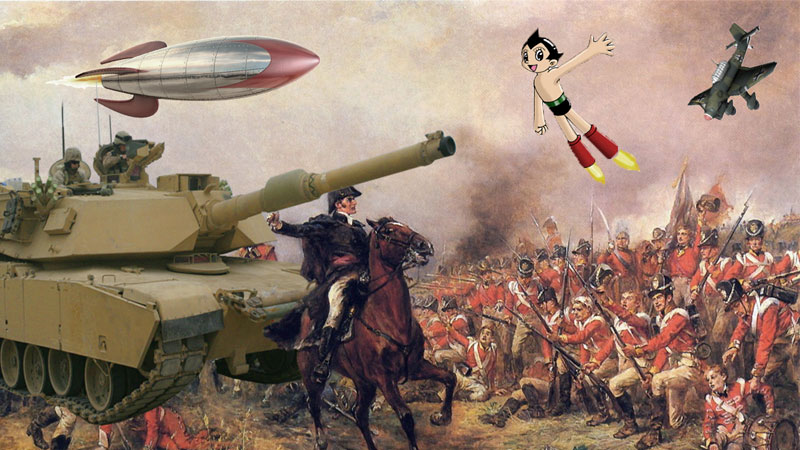
US Ambassador to Ukraine Geoffrey Pyatt tweeted some images that weren't what he said they were. At least he didn't tweet this. (Images edited by Kevin Rothrock.)
The shooting war in Eastern Ukraine has an ugly sibling that people outside Ukraine know far better: the news war. In Donetsk and Luhansk, men with guns exchange bullets and bombs. Online and in the media around the world, reporters, officials, and ordinary Internet users exchange tweets and blog posts. One is localized; the other is global. One is—well, you get the point.
Earlier this week, the United States Army started joint military exercises with 14 other nations in Yavoriv, Ukraine. “Rapid Trident” is meant to support “interoperability among Ukraine, US, NATO, and Partnership for Peace member nations.” About 1,300 soldiers are involved in what the Army says are “battalion-level field training exercises.”
America’s ambassador to Ukraine, Geoffrey Pyatt, has tweeted several times about the start of Rapid Trident. Inexplicably, the ambassador seems to have tweeted at least two photographs that are not actually from Rapid Trident, though his tweets say they are. One of the images is more than a month old, and the second photograph is almost a year old.
In Russia, Pyatt’s misleading tweets made news headlines quickly. The English-language service of the pro-Kremlin news agency RT (formerly “Russia Today”) reported Pyatt’s mistake within hours, saying Pyatt was left “red-faced after posting unverified shots on Twitter.” RT didn’t take credit for the discovery, however. Instead, it credited “some bloggers” with revealing that Pyatt’s “version of events” were “fabricated and manipulated [sic].”
But the story about the terrible tweets hasn’t been much to shout about on the RuNet. Two days after RT’s report, Echo of Moscow did host a blog post by a member of Russia’s Civic Chamber (a consultative body of the federal government), but overall bloggers do not appear to have paid Pyatt’s tweets much attention.
In a Russian-language summary of the scandal, RT didn't give any further specifics about the netizens responsible for catching Pyatt’s slip-up, but it did cite freelance journalist and occasional RT-collaborator Graham Phillips, who wrote the US ambassador a nasty note on Twitter:
Нет, Посол США @GeoffPyatt – это не сегодня – это старые фотографии – и вы просто врун. https://t.co/CWNZNUR2EW – http://t.co/dEchWFFGf8
— Graham Phillips (@GrahamWP_UK) September 15, 2014
No, Ambassador of the USA, this isn’t today, these are old photographs, and you’re just a liar.
RT correspondent Marina Portnaya seemed to find Pyatt’s mistake especially obscene, telling viewers:
Now the US administration has been relying on Twitter in part to shift public opinion surrounding the crisis in Ukraine, but [sic] it’s clear that Washington does want to present its version of what’s happening there, but obviously the PR campaign falls apart when the world discovers that fake [sic] and outdated pictures are being presented as fact.
When Portnaya finished her speech, RT’s anchor responded, “Yeah, Marina, the world will not be duped anymore.” Indeed, America’s diabolical plan to dupe the world has been foiled.
The Rapid Trident military exercises are real, however, and—after three days—they’re not even over. In fact, there is still more than a week left of marching, shooting, and driving around. Ambassador Pyatt’s tweets are a stupid mistake, undoubtedly. One assumes the embassy’s staff running his Twitter account simply searched the Internet for images labeled “USAREUR” and “Ukraine,” posting whatever looked impressive enough. (Neither Ambassador Pyatt nor the US State Department responded to RuNet Echo’s requests for comment.) Perhaps more embarrassingly, the clearly inaccurate tweets are still published on Twitter! (No one in Pyatt’s office has deleted them!)
That said, bureaucrats—maybe by definition—make mistakes. And it’s not as though US propaganda on Ukraine was perfect up until this gaffe. America’s social media outreach on the Ukraine crisis has always been flawed, if only because Uncle Sam is up against an adversary that frequently camouflages its online propaganda as “grassroots” activism.









5 comments
next time add #BREAKING :)
Is it the same “honest” Pyatt who tweeted information about Russian shelling and invasion of Ukraine, which US State Department used as a proof?
blind russian troll
LOL @ your desperation.
Sergey, is this all you can say? You can’t back anything up, you have no proof of a “Russian invasion” (it must be invisible, right?) so the only thing you are left with is calling someone a troll. You’re pathetic